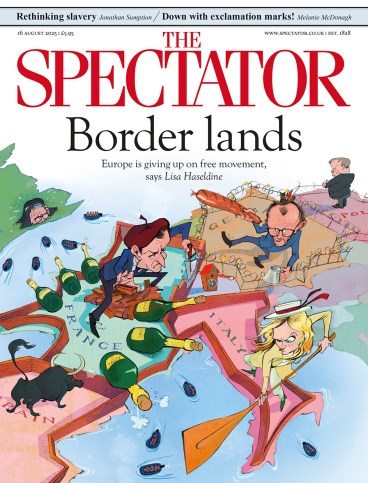
Punctuation is a gendered thing. I’ve been trying to stop myself overusing exclamation marks and it’s been difficult. Exclamation marks are girly because they’re a way of taking the sting out of what you say; they make any pronouncement seem more tentative, less serious. They’re the equivalent of a disarming smile, the marker that says: ‘No offence!’ You add them at the end of a sentence to prevent anyone thinking that you’re being bossy or critical. They’re an economical form of non-confrontation.
Women use them far more than men. Almost 20 years ago, a study in Journal of Computer-Mediated Communication found that women used nearly three-quarters of the exclamation marks in electronic messages, but it identified the tic as ‘markers of friendly interaction’. As far as I can work out, nothing has changed since. Reviewing, gloomily, my own record of ‘Hope that helps!’ or ‘Yes please!’ I find this is less to do with enthusiasm than with a desire to please, or at least a desire not to seem pushy. I’ve just sent someone a message saying, ‘Get ahead of the herd’ (I meant, ‘Just get on with it’) and I’ve had to stop myself putting in an exclamation mark to take the sting out of being bossy. Now he probably does think I’m bossy.
Then I ask myself whether the silverback males I know use punctuation the same way, and the answer is nope. My rule from now on is, if Sir Paul Dacre wouldn’t use it, I shouldn’t either.
Kisses, or Xs, serve something of the same purpose, with the difference that women mostly use them with other women. Xs are another marker of non-aggression. They say: friend, I come in peace, even though I may be complaining or telling you what to do. It’s a bit like how younger people use the Australian uplift at the end of sentences, turning every statement into a question. It’s a way of avoiding seeming dogmatic or assertive, but that’s generational rather than gendered.
One friend has beaten me to austere punctuation. ‘Nowadays when I write to men,’ she says, ‘I am brief, unapologetic and focused on the message. This is a recent thing. I realised that for as long as I have been writing to other people, I had thought I needed to charm them. I thought this was what everyone wanted. They don’t, particularly men.’ She’s now binary in her communications: entirely dispassionate or psychotically overnuanced.
There is a place for charm in written social intercourse in which punctuation plays a role, but part of the problem of contemporary interaction is that our categories are now blurred. We write to our bank manager (if we’ve got one) with the same easy informality as to a close friend. We’ve gone from ‘Dear Madam’ to ‘Hi Melanie’ (a very tetchy message to me from the press office of the Metropolitan Police began that way), and we sign off with ‘Cheers’ in both contexts, which means we use with colleagues or superiors the same sort of formula we’d use socially. It’s the democratisation of communication, and it’s confusing. Perhaps we should stop being ingratiating – exclamation marks and kisses are just that – and go for plainness if that’s what’s needed. The words ‘please’ and ‘thank you’ work well, though again, it’s all about nuance.
As for the other trick to ensure you don’t sound dogmatic, ellipses, I wonder if they’re gendered too. These are deep waters…








Comments